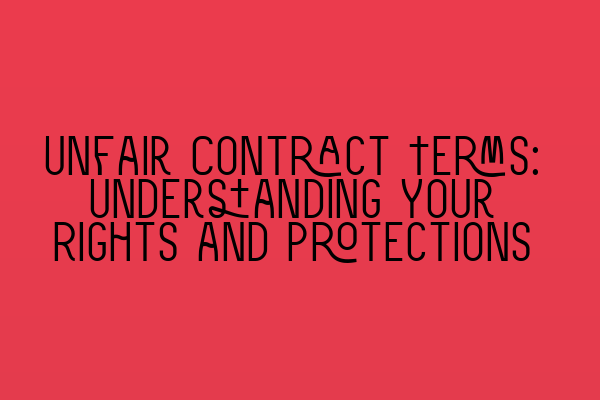Unfair Contract Terms: Understanding Your Rights and Protections
Introduction:
In the world of contract law, there is an essential principle that should always be upheld – fairness. Unfortunately, there are instances where one party may try to exploit the other by inserting unfair terms into a contract. It is crucial for individuals and businesses to be aware of their rights and protections when it comes to unfair contract terms. In this blog post, we will delve into the concept of unfair contract terms, discuss the legal framework surrounding them, and provide insights into how you can protect yourself. So, let’s dig in!
What are Unfair Contract Terms?
Unfair contract terms refer to clauses or provisions within an agreement that create an imbalance of rights and obligations between the parties involved. These terms are often drafted in a way that favors one party excessively, leaving the other party at a significant disadvantage. By incorporating unfair terms, the party with more bargaining power seeks to limit the rights or remedies of the weaker party, resulting in an unfair and unbalanced contract.
Understanding the Legal Framework:
To prevent the prevalence of unfair contract terms, most jurisdictions have enacted laws and regulations that provide consumers and businesses with legal protection. For example, in the UK, the Unfair Contract Terms Act 1977 (UCTA) and the Consumer Rights Act 2015 (CRA) play a crucial role in safeguarding parties against unfair terms.
Under the UCTA, a term in a contract will be considered unfair if it:
1. Restricts or excludes liability for negligence or breach of statutory duty in certain circumstances.
2. Imposes unfair financial or other burdens on one party.
3. Attempts to limit the rights of consumers or non-business clients from taking legal action.
The CRA provides additional safeguards for consumers, prohibiting unfair contract terms that are used in consumer contracts. It sets out that terms in consumer contracts must be fair and not place consumers at an unfair disadvantage. If a term is found to be unfair, it can be rendered void, unenforceable, or open to challenge.
The Importance of Fairness in Contractual Relationships:
It is vital to emphasize the significance of fairness in contractual relationships. Contracts serve as the binding foundation that governs the rights and obligations of all parties involved. When fairness is compromised, it can lead to serious consequences, such as financial losses, damaged reputation, and legal implications.
Protecting Yourself Against Unfair Contract Terms:
To protect yourself from falling victim to unfair contract terms, follow these essential steps:
1. Read and Understand: Read the contract thoroughly, paying close attention to any clauses, conditions, or exclusions. Make sure you understand the terms and its implications before signing or agreeing to anything.
2. Seek Legal Advice: If you are unsure about any aspects of the contract or suspect unfair terms, it is wise to seek legal advice from a qualified solicitor. They can analyze the contract, identify any unfair terms, and guide you on the necessary actions.
3. Negotiate and Amend: If you discover unfair terms in a contract, don’t hesitate to negotiate and propose amendments. Parties can often find a middle ground that benefits both parties while ensuring fairness and balance.
4. Report Unfair Terms: If you come across unfair terms in a consumer contract, report this to the relevant regulatory body or consumer rights organization. By doing so, you contribute to the overall protection of consumer rights and help raise awareness of unfair practices.
Conclusion:
Understanding your rights and protections when it comes to unfair contract terms is crucial for maintaining fairness in contractual relationships. By familiarizing yourself with the legal framework, being vigilant, and seeking professional advice, you can safeguard your interests and ensure you are not subjected to unfair terms. Remember, a fair contract lays the groundwork for a solid and harmonious business relationship.
